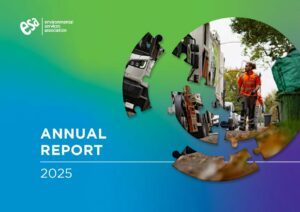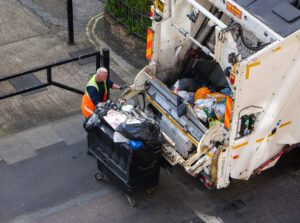The UK Emissions Trading Scheme Authority has published consultation documents seeking stakeholder views on its proposals around the inclusion of energy recovery from waste in the Emissions Trading Scheme (ETS).
These proposals effectively introduce a cap on the emissions allowed from energy from waste plants, which are used across the UK to treat general rubbish (residual waste). The cap will decrease over time and if operators emit more carbon than their allowance, they will need to buy a permit for the additional emissions – either from Government or from other emitters who have used less than their allowance. The hope is that a decreasing cap will drive down carbon emissions over time which, for energy from waste plants, will primarily be achieved by increasing recycling (particularly for plastics), lowering waste volumes and developing carbon capture, usage and storage (CCUS) infrastructure.
The recycling and waste treatment sector has already reduced emissions by some 63% since 1990 but further policy is needed to continue the drive to net zero by 2040. The Environmental Services Association (ESA) supports the inclusion of energy recovery within the ETS as a key tool to underpin further sector decarbonisation.
The proposals represent a “seismic shift” to waste treatment in the UK and should drive down carbon emissions associated with residual waste treatment, but the ESA has warned that the proposals must be carefully designed to achieve their goals and avoid unintended consequences. Failure to properly design a scheme for the sector, and to provide complementary new policy support for recycling and waste avoidance, could see waste fall back down the waste hierarchy into landfill, exported abroad, or simply incurring significant unavoidable costs for businesses and local authorities.
In anticipation of the changes, the ESA has been actively working with the sector and policy makers to help ensure the ETS is an effective tool. In September 2023, the ESA published a strategy document entitled A Sustainable Transition to the Emissions Trading Scheme which sets out a roadmap for the successful inclusion of energy recovery in the ETS. Additionally, the ESA has formed multiple working groups helping to gather data and develop a comprehensive response to the consultation published today. Additionally, the ESA recently held an ETS webinar which was attended by more than 800 people from organisations across the sector – which is indicative of its importance. The ESA today urges all stakeholders involved in recycling and waste treatment to engage with the ESA and its members and to respond to the consultation before its closure on 18th July 2024.
In accordance with the ESA’s developing ETS strategy, the ESA views timing of the inclusion of EfW in the ETS alongside other policies as critical. In particular, to avoid waste material simply transferring from EfW into other treatment solutions, the ETS must be aligned with new complementary policy positions for landfill, waste-derived fuels and demand-side drivers for recycled plastics.
On Landfill, the ESA believes that the ETS timing must align with a ban on sending combustible waste to landfill, and that the landfill tax rate should be maintained in line with inflation with a carbon price escalator to ensure its continued effectiveness. The ESA welcomes today’s acknowledgement that landfill tax must consider carbon pricing but the ESA is disappointed to not see comprehensive proposals limiting the amount of waste going to landfill.
Head of Climate and Energy Policy at the ESA, Charlotte Rule, said: “Including energy recovery from waste in the Emissions Trading Scheme is a major policy lever likely to trigger a seismic shift for the recycling and waste treatment sector. It holds the potential to reduce carbon emissions from residual waste treatment and help drive investment in decarbonisation. Recycling and waste treatment is a complex sector, so the ESA and its members are working to support policymakers and to ensure this critical policy does not create unintended consequences that push waste down the hierarchy.
This consultation is critical to the success of the ETS in the context of our sector and we are pleased to receive the documents ahead of the General Election – allowing our sector time to review and respond comprehensively while Parliament is dissolved. However, we hope that this will not be an impediment to continued engagement with Whitehall officials which would undermine the effectiveness of this consultation period.
On review of the consultation documents, we are somewhat concerned to see little to no mention of a landfill ban for combustible material and that Government’s preference is to precisely measure carbon emissions arising from plants rather than taking a more pragmatic and flexible approach.
The inclusion of energy recovery in the ETS will only succeed if accompanied by complementary policies to prevent residual waste material from transferring from domestic energy recovery into landfill or export markets, and that the ETS provides a clear, pragmatic and deliverable methodology for fairly allocating costs across the residual waste value chain to drive decarbonisation investment.”




